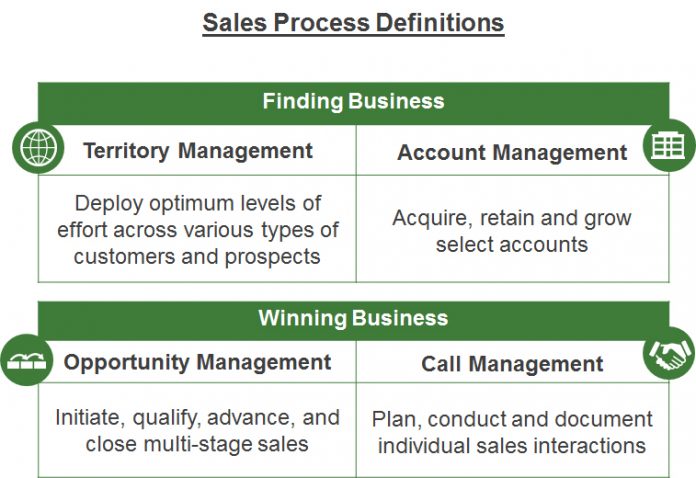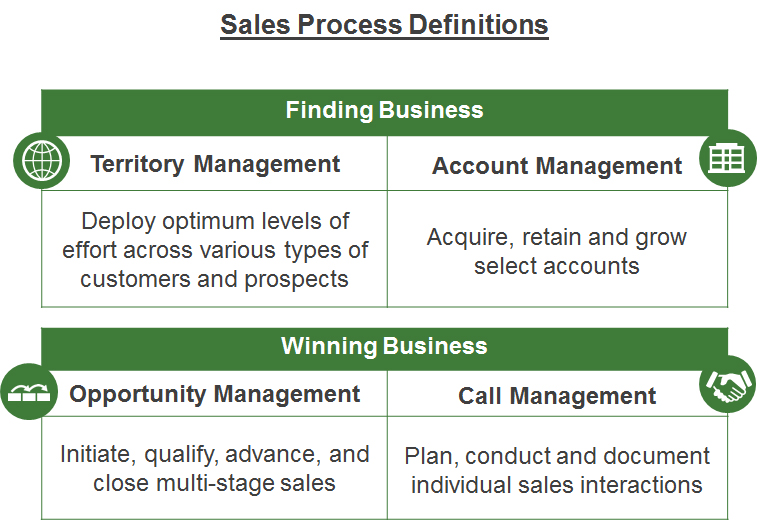
CSO Insights’ Sales Optimization Studies has repeatedly shown that companies with formal sales processes outperform companies without them. Ten years ago, a formalized sales process was just a dream. Today it is a reality. Most companies not only have formalized processes, they have embedded them within their customer relationship management (CRM) systems and can report on progress through each stage.
What is a “sales process,” and why does formalizing it matter for sales management? A sales process is a set of seller activities designed to achieve a certain outcome. Vantage Point’s research published in Cracking the Sales Management Code uncovered four seller processes that organizations care about.

These activities are important for sales success, so most companies track and report how successfully they are executed. Unfortunately, technologies such as CRM forced organizations to codify sales processes within sales tools before the processes were well defined. This resulted in sales processes that were cumbersome, didn’t accurately reflect how buyers buy, and were not particularly useful in helping sales reps sell more effectively.
Once Upon a Time…
At the same time companies were dealing with CRM implementations, concurrent efforts were being made to improve selling skills through sales training, mostly for sales reps. Sales training was often an attempt to create a more formal approach to selling and to improve the rigor with which sellers executed their day-to-day activities. Companies invested training dollars in sales methodologies such as SPIN Selling and Strategic Selling, added discipline to their sales efforts, and reaped large gains. Although the rigor often declined over time, an improved level of productivity remained. Here’s how some of the more popular sales methodologies improved rep’s sales processes:
- Account Management: Miller Heiman’s Large Account Management Process and Target Market Systems’ Enterprise Selling Process provided organizations with tools and steps to effectively manage major accounts to drive retention and growth.
- Opportunity Management: Miller Heiman’ Strategic Selling and Sales Performance International’s Solutions Selling offered methodologies and tools for effective opportunity management.
- Call Management: Huthwaite’ SPIN Selling offered a methodology and tools for conducting more effective sales calls, as did the Sales Executive Council’s Challenger Sale.
During this period, early investments in sales rep training and associated sales methodologies resulted in big gains in sales productivity because they accomplished some important outcomes:
- They codified for sales reps what good selling looks like, from qualifying opportunities, to differentiating solutions, to closing deals. Organizations identified the universe of possible sales activities and then institutionalized those that were most critical to winning more deals.
- They gave sellers clarity of task on how to sell. This clarification removed ambiguity and freed up seller mindshare for the execution of selling tasks.
- They gave organizational leaders confidence that a consistent approach could and should be used across many sellers, removing variability in sales approach.
- They helped simplify CRM systems and tools to orient around “the way we sell” within a given organization.
The New Frontier for Sales Management
Today, this time-tested strategy—purchasing sales methodology to increase discipline in the sales force—has outgrown its useful life. Now companies are already on the sales process bandwagon, and additional investments in new sales methodologies fall short of desired outcomes because they largely duplicate prior efforts. Sales and training leaders who purchased sales methodologies in the early 2000s have fond memories of the uptick in results, but similar investments no longer yield high returns. This is the primary reason why recent investments in The Challenger Sale or Consultative Selling have been lackluster at best and disruptive at worst.
Given this new reality, what is the next frontier in sales productivity and training? What are organizations to do in lieu of further investments in new sales methodologies?
We believe organizations need to target a different audience—the largely ignored population of front-line sales managers. Why? Because once a robust sales process has been formalized and institutionalized, the biggest task is to ensure effective execution. Effective and consistent execution of any sales process is the responsibility of the front-line sales manager. The big questions are now: How do we leverage this vital sales resource, and what are the implications for training and development?
Vantage Point research indicates that sales managers who conduct the right kinds of rep sales coaching in the right frequency outperform those with less discipline. We further discovered that the top 25 percent of sales managers outperformed the bottom 25 percent by a staggering $3.5 million per manager per year.
The evidence is clear: The new frontier of sales productivity is squarely in the realm of the front-line sales manager. To take your sales force to the next level, shift your thinking, your resources, and your training efforts to where it matters now.
In Part 2 of this article, which will post May 5, Michelle Vazzana examines why and how shifting to sales management process and training is so effective.
Michelle Vazzana is a founding partner at Vantage Point Performance, a global sales management training and development firm. Vazzana is also co-author of “Cracking the Sales Management Code.” She speaks on the topic of sales management and leadership and has more than 28 years of successful sales and management experience. Sign up for Vantage Point’s newsletter to stay up to date with the latest sales manager research and best practices.




